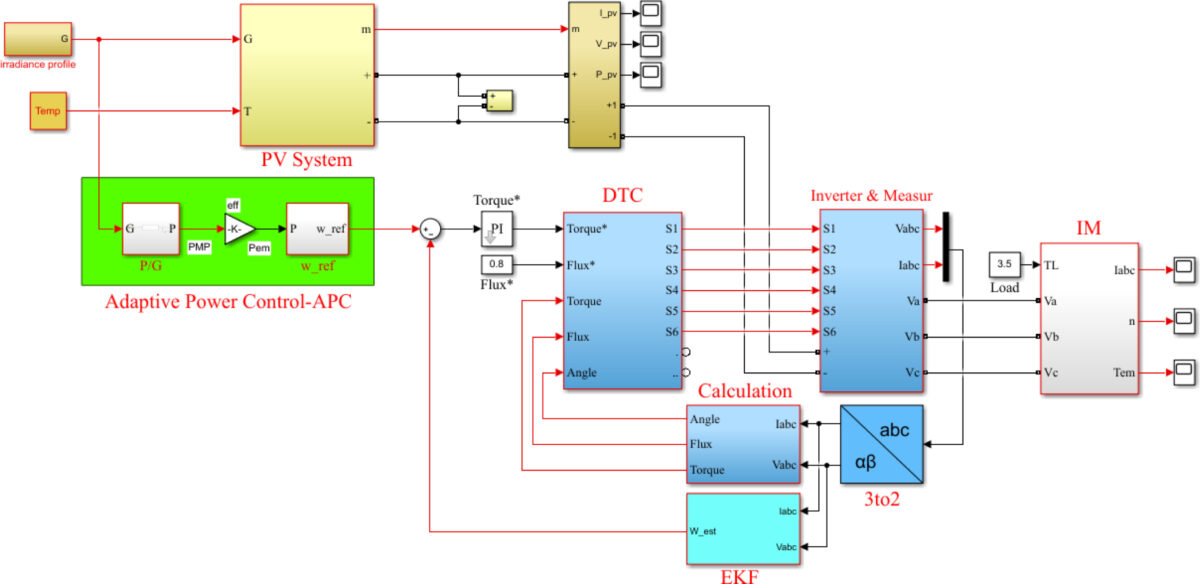A Turkish research group has created a novel control algorithm for PV-powered water pumps operating under variable irradiance intensity.
PV-powered water pumps are mainly used in agricultural irrigation, in locations where power transportation is expensive or unavailable. They often use induction motors due to their small form factor, robustness, and high efficiency. However, according to the researchers, controlling induction motors in order to produce constant torque is challenging, as they involve nonlinear dynamics and unknown load inputs, as well as time-varying mechanical and electrical parameters.
The scientists explained that their new adaptive power control (APC) technique has a structure that enables the water pump to work with high performance and efficiency at every operating point, with the algorithm being able to accurately determine the maximum power point of the PV system and the rotor speed of an induction motor under varying atmospheric conditions.
“By employing a single irradiance sensor and eliminating the need for a speed sensor, the method becomes more cost-effective and practical,” they stated. “The proposed sensorless maximum power point tracker (MPPT) method successfully tracks the maximum power points of the PV system and efficiently transfers the variable power produced by the PV system to the pump.”
In order to to calculate the real speed of the motor without the speed sensor, the new method also uses the Extended Kalman–Bucy filter, which is commonly used for estimating state vectors of objects in track. “The Extended Kalman–Bucy filter was selected due to its reputation as the most effective and systematic state and parameter estimator in the literature,” the academics said. “The filter’s ability to be easily applied to a known system’s state space model, its capability for parameter estimation, and most importantly, its noise filtering ability are the reasons for choosing this algorithm.”
Through a simulation, the group tested the effectiveness of the algorithm on a water pumping system based a 1.2 kW PV array and a 1.1 kW induction motor. It found that the motor successfully follows the reference speed generated by the APC.
Popular content
“The developed adaptive method not only improves the overall efficiency of the photovoltaic water pump system but also contributes to the sustainability and feasibility of renewable energy applications,” the scientists concluded. “By reducing the reliance on additional sensors and control hardware, the proposed method provides a cost-effective solution for harnessing solar energy in water pumping applications.”
They presented the algorithm in the paper “Speed sensorless Adaptive Power Control for photovoltaic-fed water pump using Extended Kalman–Bucy filter,” published in energy reports. The researchers come from the Batman University and the Firat University in Turkey.
Looking forward, they suggested suggested further testing the novel controller in a larger-scale PV-powered water pump system, along with its combination with different energy storage techniques.
This content is protected by copyright and may not be reused. If you want to cooperate with us and would like to reuse some of our content, please contact: editors@pv-magazine.com.


By submitting this form you agree to pv magazine using your data for the purposes of publishing your comment.
Your personal data will only be disclosed or otherwise transmitted to third parties for the purposes of spam filtering or if this is necessary for technical maintenance of the website. Any other transfer to third parties will not take place unless this is justified on the basis of applicable data protection regulations or if pv magazine is legally obliged to do so.
You may revoke this consent at any time with effect for the future, in which case your personal data will be deleted immediately. Otherwise, your data will be deleted if pv magazine has processed your request or the purpose of data storage is fulfilled.
Further information on data privacy can be found in our Data Protection Policy.